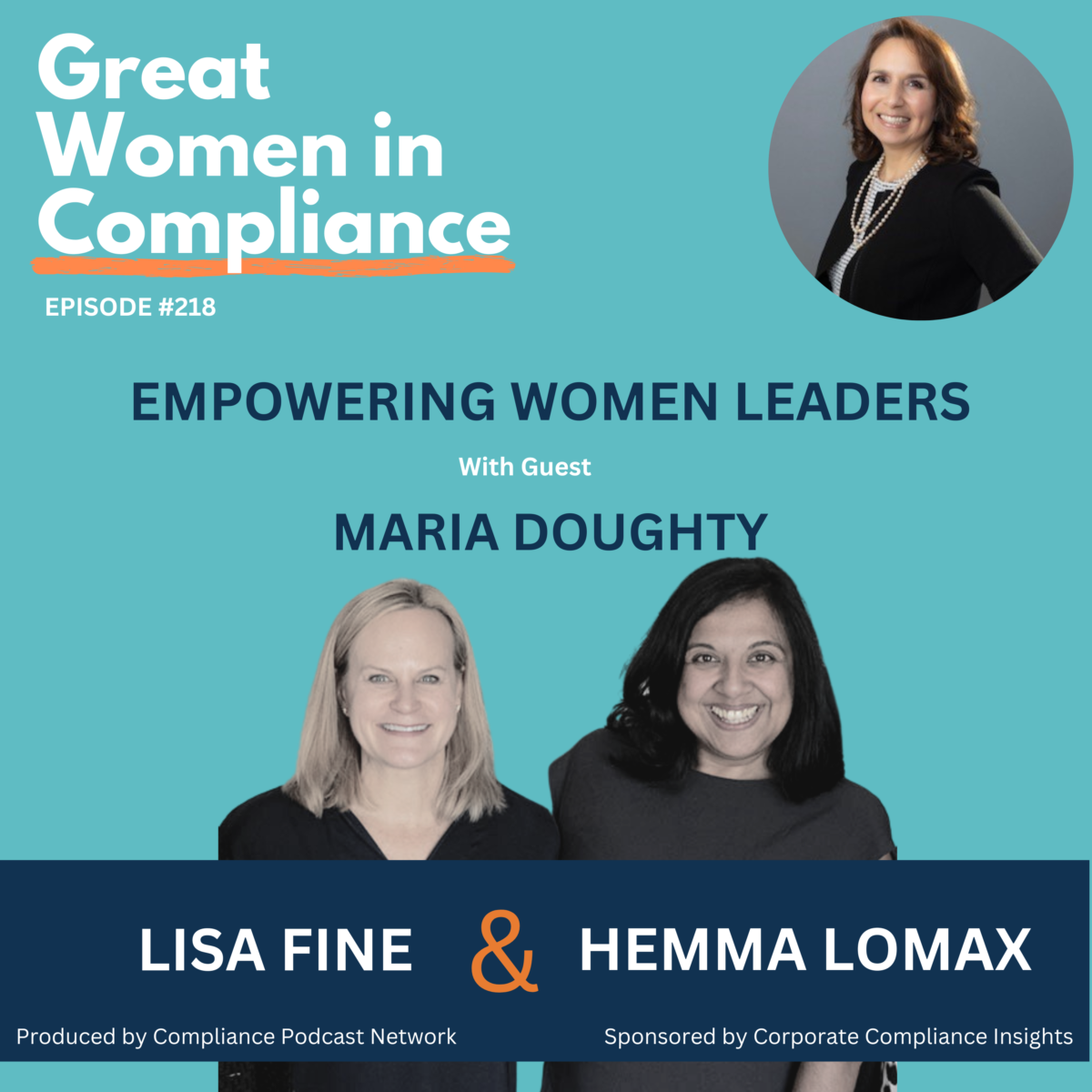Lisa Fine recently sat down with Maria Doughty for an episode of Great Women in Compliance. As the CEO of The Chicago Network, the premier organization of Chicagoland’s most influential women leaders, Maria leads with a deep personal purpose. She is an ambassador for the organization; its purpose is to empower women to lead, and its mission is to connect women for personal and professional growth, advance communities, and support and inspire the next generation of women. She joined in April 2020 and successfully led the organization through the global pandemic, developed a new strategic plan, digitally transformed the operations, rebuilt the employee team, maintained the organization’s fiscal stability, and increased member engagement.
Maria brings significant industry experience in highly regulated areas, including insurance and financial services. She is a skilled regulatory compliance, governance, enterprise risk management, litigation, public policy, and government affairs strategist. She has considerable board director knowledge in the nonprofit and insurance industry association areas.
She is the board President of the Illinois Coalition Against Domestic Violence, a group of member entities throughout Illinois that provide services for people experiencing domestic violence. Maria is a board member of The Chicago Council on Global Affairs, a nonprofit body dedicated to increasing knowledge and engagement in global affairs. She is a current board member and the past board President of the Latino Policy Forum. This organization provides policy analysis and information on pursuing fair housing, education, and immigration laws for the Latino community. She was recently appointed as a Special Advisor to the American Bar Association’s Commission on Women in the Profession. Maria holds a gubernatorial appointment as Co-Chair of the State of Illinois Employment and Economic Opportunity for Persons with Disabilities Task Force, which aims to reform existing employment systems by implementing Employment First, a law addressing subminimum wage, housing, and transportation.
Maria has been on numerous regulatory boards in the insurance sector, including the Illinois Insurance Guaranty Fund (audit committee member), the National Conference of Insurance Guaranty Funds (audit and finance committee member), the Minnesota Joint Underwriting Association (audit and finance committee member and personnel committee chair), the Illinois Insurance Association (board chair, member of audit and finance committee), and the Wisconsin Insurance Alliance.
She previously served as the Director of Public Policy and Regulatory Examinations for Allstate Insurance Company. She oversaw the public policy team and engaged with the CEO and Senior Executive Leadership Team surrounding local, state, and national issues. She educated and influenced legislators, regulators, and other stakeholders in this role. She saved the company millions in potential fines, oversaw the legal and compliance issues surrounding ESG reporting, and helped manage public opinion on ESG-related critical problems. Maria also led the regulatory examination team, overseeing market conduct examinations and other regulatory investigations countrywide.
Women in leadership roles have long faced challenges and barriers in various sectors, but organizations like The Chicago Network are working to change that narrative. Established in 1979, The Chicago Network is a premier organization that empowers women leaders across Chicagoland. With over 500 influential members, including Fortune 50 CEOs, university presidents, senators, and more, the organization aims to promote gender equity and create a supportive professional and personal growth environment.
One of the critical discussions highlighted in the podcast episode is the importance of empathy in leadership. Maria emphasized the significance of being an empathetic leader, putting oneself in the shoes of others, and maintaining personal boundaries. Empathy is not always easy, especially for problem-solving individuals, but it is crucial for effective leadership and fostering supportive relationships within a team.
Supporting women in leadership roles is another crucial aspect discussed in this episode. The Chicago Network focuses on creating opportunities for women to advance in their careers, including serving on for-profit boards. By building relationships, supporting each other both professionally and personally, and being transparent about expectations, women can help each other break barriers and achieve success in leadership positions.
Diversity in decision-making processes is also highlighted as a critical factor in successful leadership. The organization recognizes the value of diverse voices at the table, which helps avoid groupthink and foster critical thinking. Organizations can create a more inclusive and diverse leadership landscape by promoting diversity and inclusion, leading to better decision-making and outcomes.
Maria underscored the importance of women supporting each other across different sectors and backgrounds. By focusing on gender equity, which includes women of all colors and ages, organizations like The Chicago Network are working towards a more inclusive and supportive environment for women in leadership roles. The emphasis on authenticity, vulnerability, and genuine support within the organization sets it apart and creates a unique space for women to thrive and excel in their careers.
Women in leadership face various challenges, but with the support of organizations like The Chicago Network and the emphasis on empathy, diversity, and support, women can empower each other to break barriers and achieve success in leadership roles. As Maria Doughty aptly says, “When women help each other, there’s no stopping.” Empowering and supporting each other is not just a mantra but a powerful tool for creating a more inclusive and diverse leadership landscape.











